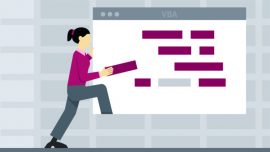Oracle Database 11g: Administration II

Course Objectives
The overall objective of this course is to bring database administrators beyond a basic understanding of their environment and to focus attention on more advanced skills needed to effectively configure, administer, monitor and tune the database within a large-scale enterprise. Specific subjects to be considered are:
• Automatic database management, monitoring and tuning facilities. Included is automatic management of storage space and memory resources within the database.
• Using Oracle flashback technology to recover from user errors and from database failures, including flashback data archive and flashback transaction backout along with the Total Recall capability.
• Controlling resource utilization on database servers whose resource demand exceeds its capacity.
• Automating launching routine maintenance tasks and even application functions using the database Scheduler.
• Handling database corruption.
• Utilizing diagnostic sources in troubleshooting database problems and employing the Fault Diagnosability Infrastructure to capture fault data.
• Automatic resumption of database operations even in the face of failures and errors.
• User-managed and automatically managed backup strategies and database recovery operations.
• Use advanced Enterprise Manager wizards and tools, including the integrated LogMiner, Flasback Transaction Backout wizard, database Recovery Wizard, and others.
• Automatic Storage Management (ASM) of some or all database files, providing a database-centric and optimized storage subsystem and volume manager.
Target Audience
The primary target audience for this course is Oracle database administrators. Oracle web server and application server administrators, as well as others who must manage an embedded repository database using Oracle database technology will also find this information useful.
This course is also recommended for technical consultants, support engineers, project managers and other technical management and support personnel.
Course Prerequisites
Many students taking this course have familiarity with system administration and administration of other non-Oracle databases, and this is helpful though not mandatory. Specific course prerequisites for this course are these Sideris titles:
• ORACLE DATABASE 11g: SQL FUNDAMENTALS
• ORACLE DATABASE 11g: PL/SQL FUNDAMENTALS
• ORACLE DATABASE 11g: ADMINISTRATION I
Suggested Next Courses
Administrators may wish to proceed onto more focused and specialized courses with these modules:
• ORACLE DATABASE 11g: PERFORMANCE TUNING
• ORACLE DATABASE 11g: SQL TUNING
• ORACLE DATABASE 11g: PARALLEL SQL & PARTITIONING
• ORACLE DATABASE 11g: DATA WAREHOUSE IMPLEMENTATION
Certification Examination
This course along with its prerequisites cover information necessary to complete the certification test EXAM #1Z1-053 ORACLE DATABASE 11g: ADMINISTRATION II.
Course Outline
MANAGING MEMORY
• ABOUT MANUAL MEMORY MANAGEMENT
• AUTOMATIC MEMORY MANAGEMENT
• MEMORY_TARGET
• MEMORY_MAX_TARGET
• SGA_TARGET
• SGA_MAX_SIZE
• WORKAREA_SIZE_POLICY & PGA_AGGREGATE_TARGET
• USING EM & THE MEMORY ADVISORS
• MONITOR IN MEMORY ACCESS MODE
MANAGING STORAGE & THE SEGMENT ADVISOR
• MONITOR TABLESPACES
• ABOUT RESUMABLE SPACE ALLOCATION
• TABLE STORAGE MANAGEMENT
• PCTFREE Illustrated
• USE THE SEGMENT ADVISOR
• Using The SHRINK SPACE Option
• CASCADE To Dependent Objects
• Optionally Call DELETE_TASK()
MANAGING RESOURCES
• DATABASE RESOURCE MANAGER ARCHITECTURE
• CONSUMER GROUPS
• RESOURCE PLANS
• AUTOMATIC & ADAPTIVE CONSUMER GROUP MAPPING
• ACTIVATING PLANS
• MONITORING RESOURCE ALLOCATION
• EXPLICIT CONSUMER GROUP SWITCHING
AUTOMATING TASKS WITH THE SCHEDULER (BASIC)
• SCHEDULER ARCHITECTURE
• RAC Environment
• MANAGE PROGRAMS
• MANAGE SCHEDULES
• MANAGE JOBS
AUTOMATING TASKS WITH THE SCHEDULER (ADVANCED)
• MANAGE JOB CLASSES
• MANAGE WINDOWS & WINDOW GROUPS
• MANAGE CHAINS
• ABOUT EVENTS & THE SCHEDULER
GLOBALIZATION
• GLOBALIZATION SETTINGS
• NLS_LANG
• NLS_LANGUAGE & NLS_TERRITORY
• DATE & TIME LOCALIZATION
• LINGUISTIC INDEXES
• ABOUT LOCALE BUILDER
DIAGNOSING DATABASE PROBLEMS
• ABOUT THE FAULT DIAGNOSABILITY INFRASTRUCTURE
• ADR Highlights From EM
• USING THE ALERT LOG
• ABOUT THE TRACE FILES
• DATABASE INSTANCE HEALTH SNAPSHOT
• USING THE SUPPORT WORKBENCH
• ENABLE ORACLE CONFIGURATION MANAGER
AUTOMATIC STORAGE MANAGEMENT
• ASM & THE BROADER DATABASE ARCHITECTURE
• CREATING THE ASM INSTANCE
• ADMINISTERING THE ASM INSTANCE
• SYSASM Super Administrator
• ASM Storage Parameters
• Using DBCA
• Using ASMCMD
• CONFIGURING DATABASES FOR ASM STORAGE
• DBCA
• DBUA
• ASM Migration Using EM
RECOVERY CONCEPTS
• ABOUT THE BACKUP & RECOVERY STRUCTURES
• MANAGING REDO DATA
• Is LOG_BUFFER Large Enough?
• What V$LOG Reveals
• What V$LOG_HISTORY Reveals
• What V$LOGFILE Reveals
• What V$ARCHIVED_LOG Reveals
• MANAGING ARCHIVED REDO DATA
• ARCHIVELOG Status
• CREATING A FOUNDATION FOR SOUND RECOVERY
ORACLE FLASHBACK TECHNOLOGY
• ABOUT FLASHBACK TECHNOLOGY
• FLASHBACK QUERY
• SELECT…AS OF TIMESTAMP
• SELECT…AS OF SCN
• Using DBMS_FLASHBACK()
• CONFIGURING UNDO MANAGEMENT FOR FLASHBACK
• UNDO_RETENTION
• FLASHBACK TABLE
• FLASHBACK DROP
• FLASHBACK VERSIONS QUERY
• FLASHBACK TRANSACTION QUERY
• FLASHBACK TRANSACTION BACKOUT
FLASHBACK DATABASE
• ABOUT FLASHBACK DATABASE
• CONFIGURING THE FLASH RECOVERY AREA
• More About DB_RECOVERY_FILE_DEST
• PERFORMING DATABASE FLASHBACK
• MONITORING FLASHBACK PERFORMANCE
• FLASHBACK DATABASE CONSIDERATIONS
• CONFIGURE FLASHBACK DATA ARCHIVE
INSTANCE RECOVERY
• ABOUT INSTANCE RECOVERY
• SMON Process & Instance Recovery
• PMON Process & Process Recovery
• INSTANCE RECOVERY PARALLELISM
• Changing RECOVERY_PARALLELISM
• MTTR ADVISOR & TUNING CHECKPOINTS
• LOG_CHECKPOINTS_TO_ALERT
• REDO LOGFILE SIZE ADVISOR
• FAST-START ON-DEMAND PARALLELISM
CONFIGURING RMAN
• RMAN ARCHITECTURE
• RMAN Sample Backup Session
• LAUNCH & USE RMAN
• CONFIGURE RMAN SETTINGS
• ALLOCATE RMAN CHANNELS
BACKUP WITH RMAN
• ABOUT BACKUP FILE TYPES
• PERFORMING FULL BACKUPS
• PERFORMING INCREMENTAL BACKUPS
• ESTABLISHING A BACKUP RETENTION POLICY
• GENERATE REPORTS
• REPORT UNRECOVERABLE
• REPORT NEED BACKUP
• LIST INCARNATION
• VALIDATE BACKUP DATA INTEGRITY
RMAN MANAGEMENT WITH EM
• MONITORING THE FLASH RECOVERY AREA
• THE EM INTERFACE TO RMAN
• SCHEDULING RMAN BACKUPS
• USING THE ORACLE-SUGGESTED BACKUP STRATEGY
• MANAGE CURRENT BACKUPS
• BACKUP REPORTS
• MANAGE RESTORE POINTS
USER-MANAGED RECOVERY OPERATIONS
• RECOVERY CONCEPTS
• RECOVER TEMPORARY TABLESPACES
• RECOVER READ-ONLY TABLESPACES
• RECOVER INDEX TABLESPACES
• RECOVER REDO LOG GROUP MEMBER
• RECREATE THE PASSWORD FILE
RECOVERY WITH RMAN
• COMPLETE MEDIA RECOVERY
• INCOMPLETE MEDIA RECOVERY
• TSPITR
• DBPITR
• RECOVERY USING EM
Course Features
- Lectures 0
- Quizzes 0
- Duration 40 hours
- Skill level All levels
- Language English
- Students 0
- Assessments Yes





